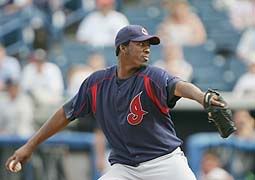Indians  Indians Archive
Indians Archive  Learning To Close
Learning To Close
 Indians Archive
Indians Archive  Learning To Close
Learning To Close
Written by
Erik Cassano
 Closing out baseball games requires a unique mindset. We've seen so many fireballers with electric stuff fail miserably in the closer role because they didn't have what it takes upstairs. In Cassano's latest, he talks about the mentality needed to close, how underappreciated Bob Wickman was here, and what Fausto Carmona will have to learn to secure the role for the long term.
Closing out baseball games requires a unique mindset. We've seen so many fireballers with electric stuff fail miserably in the closer role because they didn't have what it takes upstairs. In Cassano's latest, he talks about the mentality needed to close, how underappreciated Bob Wickman was here, and what Fausto Carmona will have to learn to secure the role for the long term.
 Visit the Papa Cass weblog at http://papacass.blogspot.com/
Visit the Papa Cass weblog at http://papacass.blogspot.com/
Bob Wickman seems to be a freak of nature in a lot of ways.
He's overweight. He doesn't throw all that hard. He lost his devastating sinker years ago. He bobs and weaves his way to saves.
Yet Wickman will go into the history books as one of the steadiest closers of this era. He left for Atlanta as the Tribe's all-time leader in saves, a mark it's safe to assume no one will threaten for a while.
How could the paunchy Wickman accomplish so much at the back end of the bullpen, while slender pitchers blessed with rubber-band arms and 98-mph fastballs be flaming busts?
The answer lies between the ears, and it's why career closers are a rare and select breed.
Wickman has an ability to roll with the day-to-day punches of baseball like few players can. He speaks of being the same player everyday. Save, blown save or mop-up appearance, Wickman felt obligated to place the previous day's performance on the shelf and get ready for the coming task.
In theory, it seems simple. In practice, it's a lot to ask, especially when a pitcher is seething over a loss the previous day. Bad appearances with the game on the line can quickly snowball until a pitcher is a psychological and mechanical mess.
It's a lesson Fausto Carmona is learning right now.
Carmona has said he's not afraid of closing. Starter, setup, close, he'll do whatever is needed, he told the cameras last month. Spoken like a true rookie, he didn't know what he was saying.
People can tell you a shark has sharp teeth. But unless you've been bitten, you don't exactly know how sharp. Monday, Carmona was bitten.
If hitters were sharks, David Ortiz would be Jaws. Five game-winning hits this year, three of them on homers. The latest victim was Carmona, who tried to blow a 2-0 fastball by Ortiz in the bottom of the ninth. Ortiz promptly placed the pitch in the centerfield bleachers at Fenway Park for a 9-8 Boston win.
It was Carmona's first save opportunity since Wickman was dealt, and it was a disaster. The cool, collected Carmona of the seventh and eighth innings was replaced with a tight, tense Carmona who suddenly realized that he had to get the final three outs of the game. He managed one out before the Ortiz bomb.
Carmona's education as a closer has begun. The first step: learn to fear. The next step -- and most difficult step -- find a way to deal with that fear.
The pitchers who can't cut it as closers never figure out how to tame the natural adrenaline rush that comes with save situations and use it to their advantage.
Carmona was schooled as a starting pitcher, which is artisan work. Starts are crafted over the course of six, seven and eight innings. pieced together through setbacks and flaws, leads and deficits.
Saves are far more cause-and-effect. You let runners on base, you give up hits, and you will lose the game in short order. You can't conduct a game the way you can as a starter. A closer is far more at the mercy of the conditions he has been placed in.
You will fail. You will let runners on base. You will blow saves. The guys behind you will make errors at the most inopportune times. Those are the factors Carmona must accept if he wants to be a successful closer.
Having a bad ninth inning is really no different than having a bad third inning, except the game is on the line. It seems like skewed logic, but it's how Wickman has constructed a long-term career in baseball's most volatile role.
We know Carmona has the arm to close. By the end of the season, we're going to know if his head and stomach can follow. In the ninth-inning jungle, that's the most important factor.
 Visit the Papa Cass weblog at http://papacass.blogspot.com/
Visit the Papa Cass weblog at http://papacass.blogspot.com/Bob Wickman seems to be a freak of nature in a lot of ways.
He's overweight. He doesn't throw all that hard. He lost his devastating sinker years ago. He bobs and weaves his way to saves.
Yet Wickman will go into the history books as one of the steadiest closers of this era. He left for Atlanta as the Tribe's all-time leader in saves, a mark it's safe to assume no one will threaten for a while.
How could the paunchy Wickman accomplish so much at the back end of the bullpen, while slender pitchers blessed with rubber-band arms and 98-mph fastballs be flaming busts?
The answer lies between the ears, and it's why career closers are a rare and select breed.
Wickman has an ability to roll with the day-to-day punches of baseball like few players can. He speaks of being the same player everyday. Save, blown save or mop-up appearance, Wickman felt obligated to place the previous day's performance on the shelf and get ready for the coming task.
In theory, it seems simple. In practice, it's a lot to ask, especially when a pitcher is seething over a loss the previous day. Bad appearances with the game on the line can quickly snowball until a pitcher is a psychological and mechanical mess.
It's a lesson Fausto Carmona is learning right now.
Carmona has said he's not afraid of closing. Starter, setup, close, he'll do whatever is needed, he told the cameras last month. Spoken like a true rookie, he didn't know what he was saying.
People can tell you a shark has sharp teeth. But unless you've been bitten, you don't exactly know how sharp. Monday, Carmona was bitten.
If hitters were sharks, David Ortiz would be Jaws. Five game-winning hits this year, three of them on homers. The latest victim was Carmona, who tried to blow a 2-0 fastball by Ortiz in the bottom of the ninth. Ortiz promptly placed the pitch in the centerfield bleachers at Fenway Park for a 9-8 Boston win.
It was Carmona's first save opportunity since Wickman was dealt, and it was a disaster. The cool, collected Carmona of the seventh and eighth innings was replaced with a tight, tense Carmona who suddenly realized that he had to get the final three outs of the game. He managed one out before the Ortiz bomb.
Carmona's education as a closer has begun. The first step: learn to fear. The next step -- and most difficult step -- find a way to deal with that fear.
The pitchers who can't cut it as closers never figure out how to tame the natural adrenaline rush that comes with save situations and use it to their advantage.
Carmona was schooled as a starting pitcher, which is artisan work. Starts are crafted over the course of six, seven and eight innings. pieced together through setbacks and flaws, leads and deficits.
Saves are far more cause-and-effect. You let runners on base, you give up hits, and you will lose the game in short order. You can't conduct a game the way you can as a starter. A closer is far more at the mercy of the conditions he has been placed in.
You will fail. You will let runners on base. You will blow saves. The guys behind you will make errors at the most inopportune times. Those are the factors Carmona must accept if he wants to be a successful closer.
Having a bad ninth inning is really no different than having a bad third inning, except the game is on the line. It seems like skewed logic, but it's how Wickman has constructed a long-term career in baseball's most volatile role.
We know Carmona has the arm to close. By the end of the season, we're going to know if his head and stomach can follow. In the ninth-inning jungle, that's the most important factor.
Posted by
Erik Cassano
Aug 01, 2006 7:00 PM
- NBA Announces 2013-2014 Schedule
- Browns Ink Sharknado
- Sharknado A No-Show For Rookie Camp
- Trent Richardson Out Until Training Camp
- Browns Sign Brandon Jackson
- Carrasco Suspended Eight Games
- Browns Add to Wide Receiver Depth with David Nelson
- Browns Need to Learn from Past Draft Mistakes
- Browns Release Chris Gocong and Usama Young
- Browns Missing on Grimes Disappointing, But Not The End
The TCF Forums
- Official- Browns Coach Search/Rumors
Larvell Blanks (Tuesday, January 21 2014 11:53 AM) - The 2014 Offseason Thread
skatingtripods (Tuesday, January 21 2014 11:52 AM) - Chris Grant's first 3 drafts
Kingpin74 (Tuesday, January 21 2014 10:13 AM) - 2015 Recruiting
furls (Tuesday, January 21 2014 6:57 AM) - Mike Brown
YahooFanChicago (Monday, January 20 2014 11:15 PM) - Movies coming out
HoodooMan (Monday, January 20 2014 9:34 PM) - 2014 Hoops Hockey Hijinx
jpd1224 (Monday, January 20 2014 4:44 PM) - 2014 Recruiting
jclvd_23 (Monday, January 20 2014 2:26 PM) - Wish List - #4 Pick
Hikohadon (Monday, January 20 2014 1:26 PM) - #1 overall pick Anthony Bennett
TouchEmAllTime (Sunday, January 19 2014 1:28 PM)



